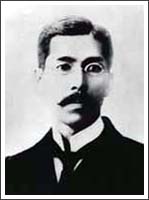Takayama Chogyu
Takayama Chogyū ( Japanese 高山 樗 牛 , civil: Takayama Rinjirō ( 高山 林 次郎 ); born February 28, 1871 in Tsuruoka ; † December 24, 1902 ) was a Japanese author and literary critic.
After attending high school in Sendai , Takayama studied at the Imperial University of Tokyo . Here he won a literary competition of the newspaper Yomiuri Shimbun with the historical romance Takiguchi Nyūdō ( 瀧 口 入道 ). As a student, he founded the literary magazine Teikoku Bungaku ( 帝国 文学 ) and became a correspondent for Taiyō magazine ( 太陽 ).
After completing his studies, he taught at his old high school, but returned to Tokyo a year later as an employee of the Taiyō magazine . In 1900 he was selected by the Ministry of Education for a study trip to Europe, which was prevented by the outbreak of a serious illness.
In the following years he wrote articles critical of literature and culture and dealt with Friedrich Nietzsche's philosophy . In the last year of his life he studied the works of Nichiren , a Buddhist teacher of the 13th century, and wrote several writings about him.
Takayama translated Goethe's The Sorrows of Young Werther into Japanese.
Since 1958, his hometown Tsuruoka has awarded the annual Takayama Chogyū Prize ( 高山 樗 牛 賞 ) to promote writers from the region.
swell
- ^ William N. Ridgeway: Gender, the Body, and Desire in the Novels of Natsume Sôseki (1867-1916), Focusing on Meian . 2002, p. 178 ( online dissertation at the University of Hawaiʻi at Mānoa ).
- ↑ 高山 樗 牛 賞 は 粕 谷 さ ん 奨 励 賞 に は 今井 さ ん と 須 田 君 鶴 岡 市 教育 委員会 . Shōnai Nippō, October 30, 2007, accessed May 29, 2010 (Japanese).
Web links
| personal data | |
|---|---|
| SURNAME | Takayama, Chogyu |
| ALTERNATIVE NAMES | 高山 樗 牛 (Japanese); Takayama Rinjirō (real name); 高山 林 次郎 (Japanese, real name) |
| BRIEF DESCRIPTION | Japanese writer |
| DATE OF BIRTH | February 28, 1871 |
| PLACE OF BIRTH | Tsuruoka |
| DATE OF DEATH | December 24, 1902 |
